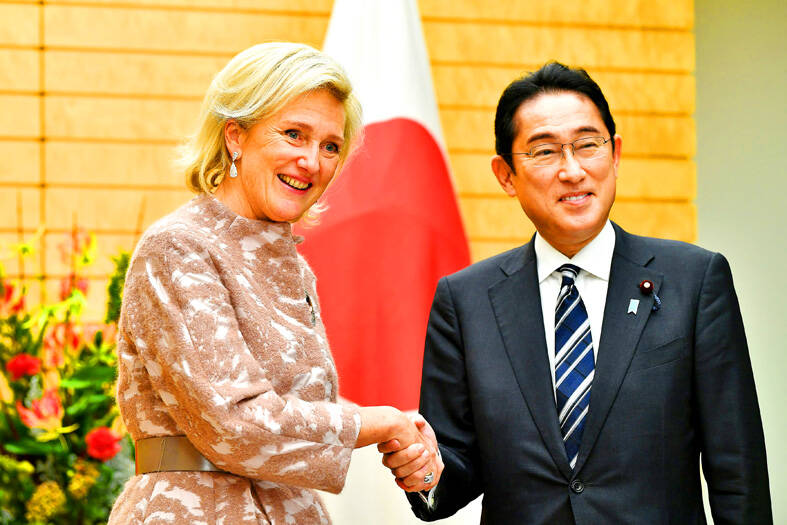Japanese Prime Minister Fumio Kishida has ordered a sharp defense spending hike that could see his long-pacifist nation’s defense budget balloon to near the levels spent by Russia.
Kishida instructed ministers to put together a budget of about ¥43 trillion (US$315 billion) for the five-year period starting in April next year, Japanese Minister of Defense Yasukazu Hamada said on Monday.
That is up 57 percent on the ¥27 trillion initially budgeted for the current five-year period.

Photo: Reuters
The change of direction for Japan, which has retained a US-drafted pacifist constitution since its defeat in World War II, comes after the nation was shocked by Russia’s invasion of Ukraine.
China’s threats toward Taiwan and North Korea’s nuclear ambitions have also lent support for Tokyo to embark on one of its largest military buildups in decades.
A poll conducted by the Yomiuri Shimbun over the weekend found that 51 percent of respondents approved of a hike to more than ¥40 trillion, while 42 percent disapproved.
The money is set to be used for items such as stockpiling missiles that are capable of striking military assets in neighbors Russia, China and North Korea.
Another goal over the next 10 years would be to triple the number of military units equipped with ballistic missile interceptors in a southwestern island chain that stretches toward Taiwan, Kyodo News reported, citing a draft of a government document.
The news met with criticism from China.
“Japan has been sensationalizing regional tensions in an attempt to seek a military breakthrough,” Chinese Ministry of Foreign Affairs spokeswoman Mao Ning (毛寧) said at a regular news conference in Beijing yesterday. “This is highly dangerous. It cannot but put Asian neighbors and the international community on high alert about Japan’s commitment to an exclusively defensive policy and to peaceful development.”
Kishida’s increase could mean Japan leapfrogs nations such as Saudi Arabia and France to become the world’s fifth-largest defense spender and reach annual spending about level with Russia, based on data provided by the Stockholm International Peace Research Institute.
However, the slump in the value of the yen against the US dollar would mean the cash might not go as far as in the past.
Ministries and ruling Liberal Democratic Party politicians have wrangled over the extent of the increase, which would place another strain on the finances of the deeply indebted and aging nation.
Kishida called for a concrete plan by the end of the year to fund the increase, including spending reforms and use of non-tax revenues as well as taxes, Hamada said.
Japanese Minister of Finance Shunichi Suzuki told reporters yesterday that adjustments would be needed to secure the necessary funds for the five-year period.
The government is set to reveal how it plans to use the funds in revised national security documents and an annual budget to be unveiled later this month.
Kishida has also ordered ministers to aim to raise total defense-related spending to 2 percent of GDP over the same five-year period. While Japan is not a member of NATO, that would meet the target set for members.

The US government has signed defense cooperation agreements with Japan and the Philippines to boost the deterrence capabilities of countries in the first island chain, a report by the National Security Bureau (NSB) showed. The main countries on the first island chain include the two nations and Taiwan. The bureau is to present the report at a meeting of the legislature’s Foreign Affairs and National Defense Committee tomorrow. The US military has deployed Typhon missile systems to Japan’s Yamaguchi Prefecture and Zambales province in the Philippines during their joint military exercises. It has also installed NMESIS anti-ship systems in Japan’s Okinawa

‘WIN-WIN’: The Philippines, and central and eastern European countries are important potential drone cooperation partners, Minister of Foreign Affairs Lin Chia-lung said Minister of Foreign Affairs Lin Chia-lung (林佳龍) in an interview published yesterday confirmed that there are joint ventures between Taiwan and Poland in the drone industry. Lin made the remark in an exclusive interview with the Chinese-language Liberty Times (the Taipei Times’ sister paper). The government-backed Taiwan Excellence Drone International Business Opportunities Alliance and the Polish Chamber of Unmanned Systems on Wednesday last week signed a memorandum of understanding in Poland to develop a “non-China” supply chain for drones and work together on key technologies. Asked if Taiwan prioritized Poland among central and eastern European countries in drone collaboration, Lin

TRAGEDY STRIKES TAIPEI: The suspect died after falling off a building after he threw smoke grenades into Taipei Main Station and went on a killing spree in Zhongshan A 27-year-old suspect allegedly threw smoke grenades in Taipei Main Station and then proceeded to Zhongshan MRT Station in a random killing spree that resulted in the death of the suspect and two other civilians, and seven injured, including one in critical condition, as of press time last night. The suspect, identified as a man surnamed Chang Wen (張文), allegedly began the attack at Taipei Main Station, the Taipei Fire Department said, adding that it received a report at 5:24pm that smoke grenades had been thrown in the station. One man in his 50s was rushed to hospital after a cardiac arrest

ON ALERT: Taiwan’s partners would issue warnings if China attempted to use Interpol to target Taiwanese, and the global body has mechanisms to prevent it, an official said China has stationed two to four people specializing in Taiwan affairs at its embassies in several democratic countries to monitor and harass Taiwanese, actions that the host nations would not tolerate, National Security Bureau (NSB) Director-General Tsai Ming-yen (蔡明彥) said yesterday. Tsai made the comments at a meeting of the legislature’s Foreign Affairs and National Defense Committee, which asked him and Minister of National Defense Wellington Koo (顧立雄) to report on potential conflicts in the Taiwan Strait and military preparedness. Democratic Progressive Party (DPP) Legislator Michelle Lin (林楚茵) expressed concern that Beijing has posted personnel from China’s Taiwan Affairs Office to its